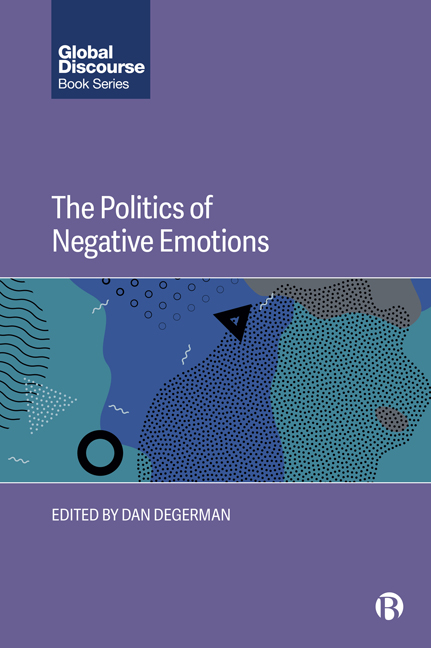Book contents
- Frontmatter
- Contents
- List of Figures
- Notes on Contributors
- Introduction: Feeling Our Way through Politics
- 1 Anger, Fast and Slow: Mediations of Justice and Violence in the Age of Populism
- 2 ‘We Will March Side by Side and Demand a Bigger Table’: Anger as Dignity Claim
- 3 Moving between Frustration and Anger
- 4 The Resentment– Ressentiment Complex: A Critique of Liberal Discourse
- 5 Green Shame: The Next Moral Revolution?
- 6 Against Comfort: Political Implications of Evading Discomfort
- 7 For Love and for Life: Emotional Dynamics at the World Congress of Families
- 8 The Functionality of Affects: Conceptualising Far-Right Populist Politics beyond Negative Emotions
- 9 Moral Economies of Exclusion: Politics of Fear through Antagonistic Anonymity
- 10 Contesting the Politics of Negative Emotions in Educational Policy Making: A Ban on Asylum Seekers’ School Visits in Finland
- Index
2 - ‘We Will March Side by Side and Demand a Bigger Table’: Anger as Dignity Claim
Published online by Cambridge University Press: 18 January 2024
- Frontmatter
- Contents
- List of Figures
- Notes on Contributors
- Introduction: Feeling Our Way through Politics
- 1 Anger, Fast and Slow: Mediations of Justice and Violence in the Age of Populism
- 2 ‘We Will March Side by Side and Demand a Bigger Table’: Anger as Dignity Claim
- 3 Moving between Frustration and Anger
- 4 The Resentment– Ressentiment Complex: A Critique of Liberal Discourse
- 5 Green Shame: The Next Moral Revolution?
- 6 Against Comfort: Political Implications of Evading Discomfort
- 7 For Love and for Life: Emotional Dynamics at the World Congress of Families
- 8 The Functionality of Affects: Conceptualising Far-Right Populist Politics beyond Negative Emotions
- 9 Moral Economies of Exclusion: Politics of Fear through Antagonistic Anonymity
- 10 Contesting the Politics of Negative Emotions in Educational Policy Making: A Ban on Asylum Seekers’ School Visits in Finland
- Index
Summary
Introduction
The subtitle of this chapter may read as paradoxical if not outright oxymoronic. At first glance, the physical experience of anger seems anything but dignified. When we are angry, our faces flush, our voices move up in both pitch and volume, our language use is more simplistic, we may stammer or swear, we gesticulate wildly; in the most extreme cases, we can stamp around or threaten (if not commit) acts of violence against objects or other creatures. In other words, the experience of anger seems to manifest nothing if not the absence or loss of dignity; our emotions overwhelm our rational brains, and we respond to the world in simplistic if not childish or violent fashions. And yet, I very much mean to defend the idea that some anger, particularly the liberatory anger of those on the margins, has at its core an assertion of personal and political dignity. To be specific, I claim that the use of dignity that is present in feminist political anger is not of the zero-sum variety (women gain status through men's loss of status), but as a claim of worth. Proponents of feminist political anger argue that women count too, and women deserve dignity and respect (in employment, in their domestic lives, in their bodily integrity, in their reproductive decisions, and so on). It is the absence of their dignity and recognition that is the injury; their anger is an assertion of presence and a demand for recognition. This demand does not require the lessening of another's dignity. We can see a version of this dynamic in both individual and collective expressions of anger.
Let me lay out some defining terms and the map of the argument. I will follow a rough version of Robert Solomon's definition of anger as a fundamentally juridical emotion; he describes anger as the ‘register[ing] of displeasure that the world does not obey our expectations’ (Solomon, 1993: 228). Solomon's description of anger as a juridical emotion is helpful; it indicates the ways in which anger represents rationality and emotionality fused (anger is a judgement). Where I depart from Solomon (and other commentators) is in broadening the definition of anger in at least two respects: first, while I do believe anger always has a target, it seems clear to me that the target of anger is not always a person, contrary to most scholars.
- Type
- Chapter
- Information
- The Politics of Negative Emotions , pp. 31 - 53Publisher: Bristol University PressPrint publication year: 2023



